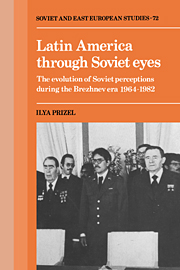 Latin America through Soviet Eyes
Latin America through Soviet Eyes Book contents
- Frontmatter
- Contents
- Preface
- Acknowledgments
- Introduction
- Part I Soviet perceptions of Latin America's global role
- Part II Soviet perceptions of Latin American social structures
- Part III Soviet–Latin American relations during the Brezhnev era
- Introduction
- 11 Case study: Mexico
- 12 Case study: Chile
- 13 Case study: Brazil and Argentina
- Part IV Conclusion: the emerging Soviet perception of Latin America and the future of Soviet policy toward the hemisphere
- Conclusions
- Epilogue – Latin America: the Long March
- Notes
- Bibliography
- Index
13 - Case study: Brazil and Argentina
Published online by Cambridge University Press: 05 February 2012
- Frontmatter
- Contents
- Preface
- Acknowledgments
- Introduction
- Part I Soviet perceptions of Latin America's global role
- Part II Soviet perceptions of Latin American social structures
- Part III Soviet–Latin American relations during the Brezhnev era
- Introduction
- 11 Case study: Mexico
- 12 Case study: Chile
- 13 Case study: Brazil and Argentina
- Part IV Conclusion: the emerging Soviet perception of Latin America and the future of Soviet policy toward the hemisphere
- Conclusions
- Epilogue – Latin America: the Long March
- Notes
- Bibliography
- Index
Summary
Whereas in Chile a strong and a well-organized communist party had provided a link with the USSR since the 1920s, and in Mexico a shared revolutionary ideology and mutual fear of the United States had fostered a close relationship with Soviet Russia, there were no significant political or ideological links between the two South American giants and the Soviet Union. Neither Brazil nor Argentina had developed massive communist parties, and in both countries homegrown populism, led by Vargas and Perón, respectively, dominated the political left. Similarly, neither Argentina nor Brazil had ever experienced a major revolution, and therefore anticapitalist and anti-imperialist rhetoric had never become the political staple it had in Mexico. The case of Brazil and Argentina is particularly intriguing, because this was a situation in which almost the entire attraction between the USSR and those two countries was economic.
Brazil
Although Brazil was the only Latin American country to dispatch an expeditionary force to Europe during World War II, it did not establish diplomatic relations with the USSR until April 1945 – and then, reluctantly. Brazil's military leadership, which had faced a communist- led uprising in 1935, remained suspicious of and hostile toward the USSR. In 1947 Brazil, responding to the pressures of the cold war, broke off diplomatic relations.
The two countries resumed contact in 1959, when the populist President Kubitschek arranged a barter deal with the USSR in which Soviet oil was traded for Brazilian coffee and hides.
- Type
- Chapter
- Information
- Latin America through Soviet EyesThe Evolution of Soviet Perceptions during the Brezhnev Era 1964–1982, pp. 168 - 178Publisher: Cambridge University PressPrint publication year: 1990


